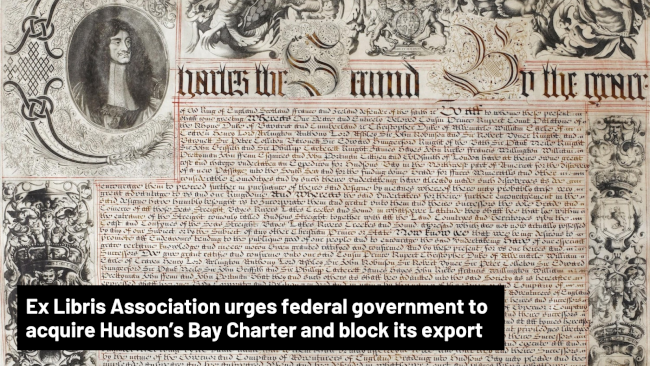
Ex Libris Association urges federal government to acquire Hudson’s Bay Charter and block its export
May 26, 2025
The Ex Libris Association (ELA) has written to the Minister of Canadian Culture and Identity, Steven Guilbeault, urging the federal government to take immediate action to secure the Hudson’s Bay Company’s Royal Charter of 1670 for Library and Archives Canada’s collection and to prevent its export or sale to a private collection.
May 26, 2025
The Hon. Steven Guilbeault
Minister of Canadian Culture and Identity
House of Commons Ottawa,
Ontario K1A 0A6Subject: Urgent Acquisition of the Hudson’s Bay Company Royal Charter for Library and Archives Canada
Dear Minister,
I am writing to you on behalf of the Ex Libris Association (ELA) and its over 200 members. ELA is the national Canadian association of people who have spent an important part of their work life in libraries, archives, and adjunct fields, and remain interested in historical and current issues related to those institutions, as well as the personal welfare of their fellow members.
We strongly urge the Government of Canada to take immediate action to secure the Hudson’s Bay Company’s Royal Charter of 1670 for the permanent collection of Library and Archives Canada, and to prevent its export from our country or sale to a private collection inaccessible to researchers.
As you are undoubtedly aware, the Hudson’s Bay Company Charter, granted by King Charles II on May 2, 1670, is among the most significant historical documents in Canadian history. This foundational document established “The Governor and Company of Adventurers of England trading into Hudson’s Bay” and granted them exclusive trading rights over the watershed draining into Hudson Bay – an enormous territory that would later form the backbone of what became Canada. The Charter effectively transferred control of Rupert’s Land, comprising approximately 40% of modern Canada, and laid the groundwork for subsequent development of our nation.
Historical Significance
The Charter’s importance to Canadian heritage cannot be overstated:
- It represents the legal foundation upon which much of Canada’s territorial claims were initially established
- It fundamentally shaped Indigenous-European relations across vast territories for centuries
- It influenced the development of Canada’s economic systems, governance structures, and cultural identity
- It directly precipitated the eventual confederation of Canadian provinces and territories
This document is not merely a corporate artifact – it is a cornerstone of Canadian history that belongs in our national archives, accessible to researchers, educators, and the public.
Risk of Export
We understand that there may be consideration to allow this priceless artifact to be exported from Canada. This would represent an irreparable loss to our national heritage. Under the Cultural Property Export and Import Act, the government has both the responsibility and authority to intervene in cases where cultural property of outstanding significance and national importance may be lost to Canada.
Recommendations
We respectfully request that your ministry:
- Immediately designate the Hudson’s Bay Charter as cultural property of outstanding significance and national importance under the Cultural Property Export and Import Act
- Allocate emergency acquisition funds to purchase the Charter for Library and Archives Canada
- If necessary, impose a delay period on any export permit to allow sufficient time for funding to be secured
- Engage with the Hudson’s Bay Company, cultural institutions, and private philanthropists to ensure this document remains in Canada
As Canada continues to reckon with its colonial history and build more equitable relationships with Indigenous peoples, maintaining custody of this foundational document is essential. The Charter represents not only our past but offers critical context for understanding present challenges and future reconciliation efforts.
The acquisition of this Charter would align perfectly with the mandate of Library and Archives Canada to preserve and make accessible the documentary heritage of our nation. Furthermore, it would demonstrate the government’s commitment to protecting irreplaceable cultural treasures for future generations of Canadians.
We appreciate your attention to this urgent mater of national importance and would welcome the opportunity to discuss it further.
Respectully,
Deborah Thomas, Past President and Chair, ELA Advocacy Committee
On behalf of
David Harvie, President
Ex Libris Association
dharvie@mac.comCC:
Andrea Ceccheto, President, Canadian Federation of Library Associations
info@cfa-fcab.caLeslie Weir, Chief Librarian and Archivist of Canada, Library and Archives Canada
lweir@uotawa.caRichard Baker, Governor, CEO, Executive Chairman, Hudson’s Bay Company
Richard.baker@hbc.com
(Via Ex Libris Association)
Add a new comment